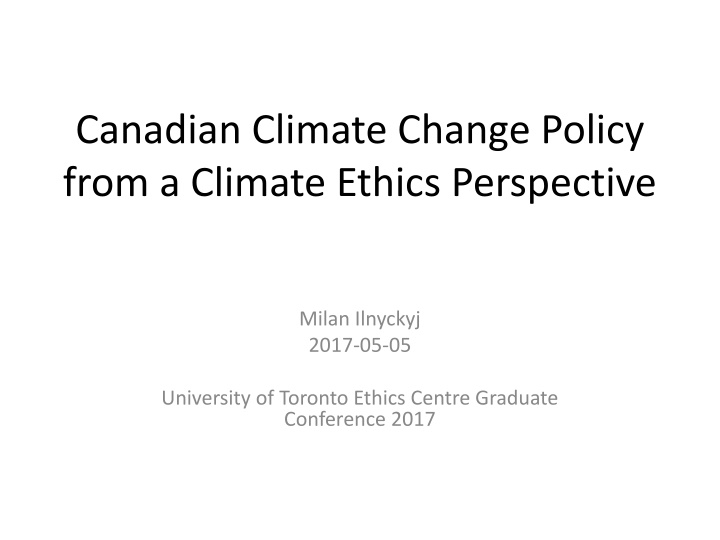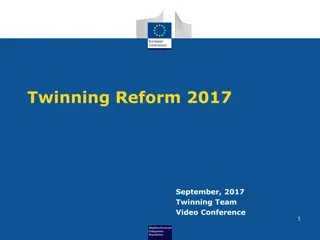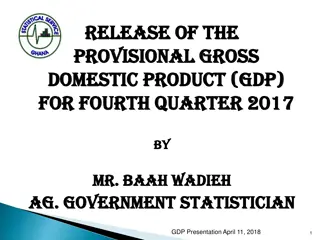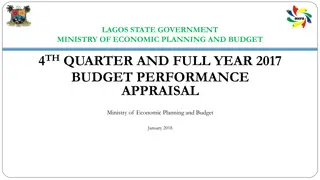Canadian Climate Change Policy from a Climate Ethics Perspective
Explore the ethical implications of Canadian climate change policy, delving into the necessity of meeting targets established in the Paris Agreement, the need for rapid decarbonization, and the availability of climate-safe energy alternatives. The presentation emphasizes the urgency of action to mitigate the high risks of climate impacts beyond 2°C, stressing the moral imperative to address climate change.
Download Presentation

Please find below an Image/Link to download the presentation.
The content on the website is provided AS IS for your information and personal use only. It may not be sold, licensed, or shared on other websites without obtaining consent from the author.If you encounter any issues during the download, it is possible that the publisher has removed the file from their server.
You are allowed to download the files provided on this website for personal or commercial use, subject to the condition that they are used lawfully. All files are the property of their respective owners.
The content on the website is provided AS IS for your information and personal use only. It may not be sold, licensed, or shared on other websites without obtaining consent from the author.
E N D
Presentation Transcript
Canadian Climate Change Policy from a Climate Ethics Perspective Milan Ilnyckyj 2017-05-05 University of Toronto Ethics Centre Graduate Conference 2017
Land recognition I would like to begin by acknowledging the land where we're meeting The sacred land on which the University of Toronto operates has been a site of human activity for 15,000 years. This land is the territory of the Huron-Wendat and Petun First Nations, the Seneca, and most recently, the Mississaugas of the Credit River. The territory was the subject of the Dish With One Spoon Wampum Belt Covenant, an agreement between the Iroquois Confederacy and the Ojibwe and allied nations to peaceably share and care for the resources around the Great Lakes. Today, the meeting place of Toronto is still the home to many indigenous people from across Turtle Island and I am grateful to have the opportunity to work in the community, on this territory. 1
Outline Through a series of linked propositions, I will argue that Canadian climate change policy under all recent governments has been unethical 1. Missing the 1.5 2 C targets from the Paris Agreement would be ethically unacceptable 2. Meeting the targets requires aggressive mitigation through rapid decarbonization 3. There are sufficient and affordable climate-safe energy alternatives 4. Countries like Canada must cut deepest and most quickly 2
Supporting materials These propositions are based on a vast literature including climate science, ethics, economics, and politics The essay which this presentation is based on is at: bit.ly/climateethics2017 In many cases, I need to rely on the credibility of bodies like the Intergovernmental Panel on Climate Change (IPCC) But there is also a strong moral case that absolutely proving the harmfulness of climate change isn t needed to establish a moral case to act. Simply imposing the risk on others is unacceptable Henry Shue is convincing in saying that you cause somebody harm if you play Russian Roulette with their head, even if the hammer of your revolver falls on an empty chamber 3
1. Why action is necessary Projected climate impacts beyond 2 C (IPCC) High to very high risk to unique and threatened ecosystems High risk of extreme weather events Moderate to high global aggregate impacts and risk of large- scale singular events Long-term risk of destabilizing the Greenland and West Antarctic ice sheets (7m each of sea level rise) threatens entire countries Storms, droughts, other extreme weather; wildfires; health impacts; security implications Risk of non-linear change powerful potential feedback effects including loss of sea ice reducing albedo, methane from permafrost, and rainforest drying out and burning 4
In 2015, an article in Nature warned that failing to constrain warming to below 2 C "would threaten the ecological life-support systems that have developed in the late Quaternary environment, and would severely challenge the viability of contemporary human societies" In the Summary for Policymakers from their Fifth Assessment Report, the IPCC explains: "Without additional mitigation efforts beyond those in place today, and even with adaptation, warming by the end of the 21st century will lead to high to very high risk of severe, widespread, and irreversible impacts globally" 5
Estimated aggregate impacts The 2006 Stern Review projected that climate change could cost 20% of global GDP Duration of effects Research in Nature Reports Climate Change concluded: carbon dioxide emissions and their associated warming could linger for millennia Faced with such risks, there is a case to be made that we should pursue multiple simultaneous decarbonization strategies any of which could solve the problem to raise the odds that one of them will (i.e. both renewables and nuclear) 6
Ethical framework It's fair to ask what ethical framework informs this analysis Relevant ethical frameworks? Utilitarian (implicit in economic analyses) Rawlsian (what emission pathway would we choose behind the veil of ignorance) Intergenerational ethics: creation care, or a pact between generations Henry Shue's emphasis on vulnerability: Shue categorizes climate change as imposing "damage or the risk of damage on the innocent and defenseless". He argues that "it is highly significant morally whether one is choosing a risk for oneself or imposing it, conditionally or unconditionally, on others" and goes on to say: "That we are imposing risks that others will inherit at birth is extremely important." Regardless of the specific ethical perspective used to justify action in response to climate change risks, I would say it's hard to defend the converse claim that we have the right to impose these impacts on nature and innocent others because of our lifestyle and economic preferences Psychologically, we can't handle time lags. But, if we were viewing this from 100 years in the future, it seems almost certain that we would agree that decision- makers in 2017 has a strong obligation to make policy choices consistent with avoiding >2 C temperature increases 7
2. Scale of effort to meet 1.5 2 C Research published in Nature in 2015 concluded that: "80%, 50% and 30% of coal, gas and oil reserves, respectively, would need to remain below Earth s surface if the world is to limit an increase in global mean temperature to 2 C" Other research in the same journal found that: "development of resources in the Arctic and any increase in unconventional oil production are incommensurate with efforts to limit average global warming to 2 C" and that: "85% of [Canada s] 48 billion of barrels of bitumen reserves thus remain unburnable if the 2 C limit is not to be exceeded" 8
A 2009 analysis estimated that a global emission peak before 2020 - followed by an 80-95% reduction in per capita emissions in developed countries by 2050 - is necessary for a sub-2 C pathway. The chances of meeting any temperature target fall with each year of inaction, while costs rise If emissions had peaked in 2011, the maximum rate of global emissions reductions necessary were estimated at 3.7% per year; delaying the peak until 2020 increases the maximum necessary annual reduction to 9%. Delay also increases the odds that feedback effects will drive temperatures significantly further than the direct impact of fossil fuel burning alone would 9
3. Decarbonization is technically and economically possible If the only choice were between a fossil fuel- powered advanced global society or pre- agricultural agrarianism or starvation, the moral question of what to do about climate change would be more complex However, there is a sound basis for concluding that decarbonization is technically feasible with today's technologies and surprisingly affordable if done efficiently 10
Possible and economical Using existing technology, fully renewable sources including solar and wind energy deployed at a sufficient scale could provide West European levels of energy use to those around the world So could other climate-safe options like nuclear fission and geothermal a variety of pathways to decarbonization can be implemented with today's technology The most credible economic analyses have shown that the costs of decarbonizing are manageable (perhaps as low as 2% of global GDP per year), provided efficient policy mechanisms are chosen Fossil fuels would eventually need to be replaced anyway, and there are co-benefits from their elimination While there have been some encouraging steps in areas like carbon pricing, Canada is mostly doing exactly what comprehensive analyses show to be inefficient: shielding politically-favoured industries and building long-lived fossil fuel infrastructure incompatible with a sub-2 C pathway. 11
4. Only contraction and convergence provides a plausible political pathway Whether measured in current emissions per person per year or total historical emissions per person, countries have contributed very unevenly to climate change with Canada among those with the worst historical record and highest current emissions Low-income states can argue with some justice that others have followed a high- carbon development path and now bear special burdens to decarbonize more deeply and rapidly and to provide assistance for lower-income states to do likewise (decarbonization can accompany a rapid decrease in global inequality in energy use, with one group reducing meat consumption and recreational travel while the other gets clean water and a reliable electricity grid for the first time) A central concept is "contraction and convergence", under which per capita emissions from low-income states may be allowed to rise modestly though never to the level of Canada today while high-income high-emission states cut more quickly as part of a global budget set using the 1.5 2 C targets As well as being fairer than an approach that ignores responsibility, this concept is likely the only politically feasible approach to deep and rapid global decarbonization 12
A global budget We need to begin thinking and acting in terms of a global carbon budget (not for one year, but for the rest of the Fossil Fuel Era) compatible with a 1.5 2 C target This has a production side, in which high-cost and high-pollution fossil fuel projects should be avoided, since we can only burn a small fraction of remaining fossil fuels anyway It also has a consumption side, in which we must rethink everything from continuing to deploy car-focused infrastructure and inefficient buildings to rethinking the emphasis on constant economic growth in our politics and ideology Shue urges us to distinguish between subsistence emissions and luxury emissions and pursue policies that discourage the latter for the benefit of the former. Even in an emergency, he argues, you sell the jewelry before you sell the blankets Existing wealth inequality must be borne in mind when we decide how to distribute the costs of the transition 13
Does foreign inaction justify Canadian inaction? My broad argument is also applicable to other high-emission rich states and rapidly developing states with rising emissions They have not endorsed adequate targets, or begun implementing plans to meet inadequate ones Still, I would not say this excuses Canadian inaction Canada's choice is between showing leadership and adding momentum to the status quo Total adjustment cost depends a great deal on how early the transition begins. Building inappropriate high-carbon infrastructure is costly both in terms of early mothballing and the need for accelerated replacement subsequently Canada's exports also power unsustainable emissions elsewhere 14
Conclusions Important caveats I'm not saying this is the only ethical problem that needs solving. Phenomena like extreme poverty and inequality may similarly compel action I'm also not saying no assistance is owed to people or communities that must transition away from fossil-dependent economies The process of deploying climate-safe energy and efficient infrastructure creates opportunities to partially rectify historical wrongs, including Canada's violent and oppressive history with Indigenous Peoples and the continued existence of extreme poverty globally we can build climate- safe energy systems which are also far fairer in distributing the benefits of high-energy lifestyles Despite mitigation costs which are expected to be manageable, creating a political context in which they can be implemented and kept in place may require major changes to forms of political and economic organization Capitalism or consumerism may be incompatible with effective climate mitigation 15























